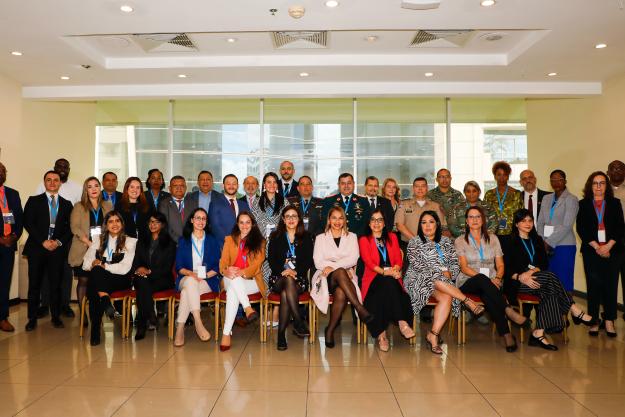GRULAC (Group of Latin America and the Caribbean) countries have been making significant progress in implementing the Chemical Weapons Convention (CWC), with ongoing support and collaboration from the Organisation for the Prohibition of Chemical Weapons (OPCW). Thirty-three experts from 23 GRULAC OPCW Member States gathered earlier this year in Guatemala City, Guatemala, to attend the Twenty-Fifth Regional Meeting of National Authorities of States Parties in Latin America and the Caribbean. The event was organised with the support of Guatemala's National Authority and GRULAC Coordinators from Ecuador and Paraguay.
The three-day event created a new momentum for promoting collaboration and knowledge exchanges, enhancing the significance of the constructive and forward-looking discussions among GRULAC countries and the OPCW Technical Secretariat. It served as a forum to discuss needs, priorities, actions taken, and best practices in relation to the CWC's implementation on both national and regional levels. Participants learned about support offered by the OPCW and heard from experts working with other international organisations, including the World Customs Organisation, the Inter-American Committee against Terrorism of the Organization of American States (CICTE), the United Nations Regional Centre for Peace, Disarmament and Development in Latin America and the Caribbean (UNLIREC), and the Police Community of the Americas (AMERIPOL).
During the event, OPCW experts emphasised the critical need for Member States to make further progress on establishing and reinforcing administrative, legislative, and judicial measures at the national level so that key provisions of the Convention are in force within their jurisdictions. Nearly half of the countries in the region lack such laws. To date, only 18 GRULAC Member States (55%) have adopted national legislation covering all initial measures - a set of key legislative measures required to implement the Convention. Ten GRULAC Member States have adopted legislation covering some initial measures, and five have not reported adopting any implementation legislation.
The event featured presentations delivered by OPCW experts and representatives from CWC National Authorities on topics such as CWC-related transport guidance for hazardous chemicals, exchanges on increasing GRULAC representation at the OPCW Technical Secretariat, the Secure Information Exchange System (SIX), Electronic Declarations Information System (EDIS), and on confidentiality considerations in correspondence between Member States and the Technical Secretariat. Also discussed were implementation issues, including verification matters, transfer discrepancies, strategic trade control, preventing the illicit trade of chemicals and the UNSCR 1540 implementation status in the region.
Participants also discussed and contributed to the development of an action plan for establishing the "GRULAC Programme", a strategic initiative, within the OPCW framework. This programme aims to promote a coordinated approach to enhance the effective implementation of the Convention in the GRULAC region. Coordination under the programme will follow the design of OPCW-supported activities that seek to address specific CWC-related needs in the region. The endorsement of the action plan towards the establishment of the GRULAC Programme marks a significant step towards a more coordinated and effective approach to CWC implementation in Latin America and the Caribbean. The Programme aims to enhancing collective efforts and resources, supporting national and regional capabilities.

Participants of the Twenty-Fifth Regional Meeting of National Authorities of States Parties in Latin America and the Caribbean
Background
As the implementing body for the Chemical Weapons Convention, the OPCW, with its 193 Member States, oversees the global endeavour to permanently eliminate chemical weapons. Since the Convention's entry into force in 1997, it is the most successful disarmament treaty eliminating an entire class of weapons of mass destruction.
In 2023, the OPCW verified that all chemical weapons stockpiles declared by the 193 States Parties to the Chemical Weapons Convention since 1997 - totalling 72,304 metric tonnes of chemical agents - have been irreversibly destroyed under the OPCW's strict verification regime.
For its extensive efforts in eliminating chemical weapons, the OPCW received the 2013 Nobel Peace Prize.






